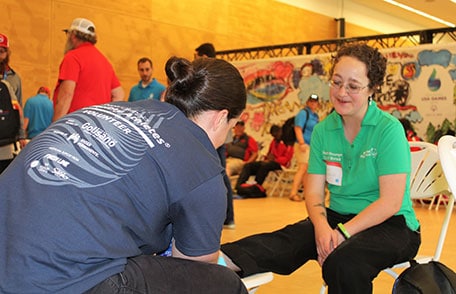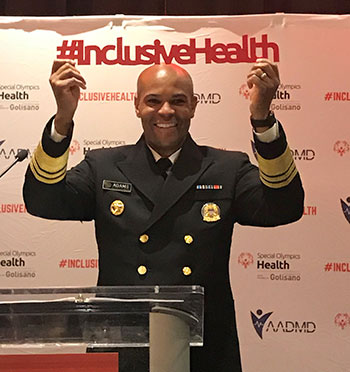Healthy Athletes at Special Olympics Games

People with intellectual disabilities (ID)—difficulty with thinking, learning, remembering, and reasoning—experience poorer access to quality health care and have poorer health outcomes than people without ID. Learn how the Centers for Disease Control and Prevention (CDC) is working with Special Olympics to improve the health of people with ID.
The Americans with Disabilities Act (ADA), enacted in 1990, has made a positive difference in the lives of countless people with disabilities in the U.S. The ADA makes those lives better by requiring improved access to streets and sidewalks, buildings and facilities, transportation, employment, and health care, and more opportunities to work, play, and contribute in their communities. However, people with disabilities continue to experience differences in health compared with those who do not have disabilities. In fact, people with intellectual disabilities (ID) are less likely to manage long-lasting health conditions such as diabetes and epilepsy, more likely to have difficulty receiving quality healthcare services, and often receive fewer preventative check-ups, such as cancer screenings.1
CDC and Special Olympics have joined forces to address these challenges, break down barriers to inclusive health services and programs, challenge misperceptions, eliminate stigma, and improve the health of people with ID. Together, CDC and Special Olympics are working toward a future where all children and adults with ID are included in programs that promote health, and have access to healthcare services throughout their lives.
Healthy Athletes
The Healthy Athletes program was created by Special Olympics to help meet the health needs of their athletes during local, state, regional, national and international events. Officially launched in 1997, Healthy Athletes events are conducted in a welcoming, fun environment and are designed to educate athletes on healthy lifestyle choices and to identify health problems that may need additional follow-up. Currently, Healthy Athletes offers health screenings in eight areas:
- Fit Feet (podiatry),
- FUNfitness (physical therapy),
- Health Promotion (better health and well-being),
- Healthy Hearing (audiology),
- MedFest (sports physical exam),
- Opening Eyes (vision),
- Special Smiles (dentistry) and
- Strong Minds (emotional well-being).
Since 2002, Special Olympics has partnered with CDC to conduct approximately 1 million Healthy Athlete screenings in the U.S. at approximately 5,000 events
Through these screenings, CDC has supported specialized training for more than 100,000 healthcare professionals in the U.S on how to provide care for people with intellectual disabilities in their practices.
Crystal’s Story
From July 1–6, more than 4,000 athletes and coaches met in Seattle for the 2018 Special Olympics USA Games. Health Messenger Crystal Womack was one of the proud participants. In fact she’s a veteran, having been a Special Olympics Washington athlete for 12 years. She has competed in track and field, golf, bowling, and ice-skating. Crystal was born with a heart condition called Tricuspid Atresia. She also has Type 1 diabetes and a visual impairment.
But these conditions don’t stop her from competing and excelling. Special Olympics gave her the tools and information that she needs to live healthy. As a Special Olympics’ Health Messenger, she serves as an ambassador, happy to educate and share these tools with her teammates. In addition, Crystal treats each health care visit as an opportunity to educate heath care providers on how to treat people with intellectual disabilities.
At the Healthy Athletes event in Seattle, Crystal had several health screenings, and received a pair of prescription glasses that she would not otherwise be able to afford.
At the Healthy Athletes event in Seattle, Crystal had several health screenings, and received a pair of prescription glasses that she would not otherwise be able to afford.
“Special Olympics to me is having friends to play with without being asked why I am the way I am, keeping active and enjoying life to the fullest with my teammates at my side!”
The Advent of Healthy Communities and Inclusive Health
CDC also supports Special Olympics in the Healthy Communities program, which extends beyond the screening tent to offer year-round access to prevention and quality health care. Through partnerships with fitness and wellness programs, as well as health care providers and other local organizations, people with ID gain access to the resources and services they need to stay healthy. The purpose is to connect people with ID to health screenings, education, and referrals for follow-up healthcare in their local communities. Healthy Communities was launched in 2012 with six Special Olympics programs piloting and helping strengthen the Healthy Communities model. Currently twenty-eight Special Olympics programs in the U.S. are recognized as Healthy Communities.
Inclusive Health
Inclusion means understanding the relationship between the way people function and how they participate in society, and making sure everybody can participate in every aspect of life to the best of their abilities and desires.
CDC is committed to the inclusion of people with disabilities in public health programs that prevent disease and promote healthy behaviors and safety, while working to eliminate barriers to health care and improve access to routine preventive services. As part of this work, CDC supports the recently launched Special Olympics’ Center for Inclusive Health. This Center provides on-line resources, training, and technical assistance for partners who are working to reduce the health disparities faced by people with ID.
Join the inclusion revolution by learning more about the health of people with intellectual disabilities and supporting their inclusion in the health programs and services they need to stay healthy!
References
- U.S. Department of Health and Human Services. The Surgeon General’s Call to Action to Improve the Health and Wellness of Persons with Disabilities. US Department of Health and Human Services, Office of the Surgeon General, 2005.




































No hay comentarios:
Publicar un comentario